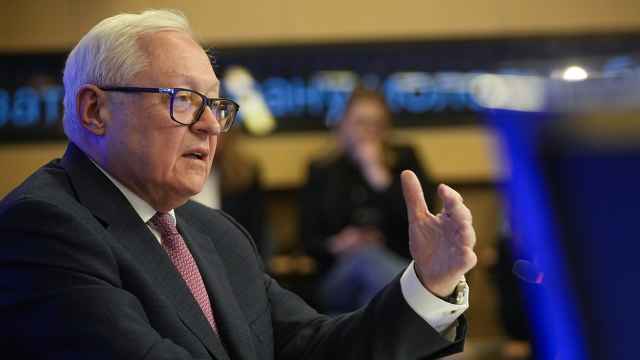When a hotel that hosts 600 business conferences a year has to turn down potential customers for lack of space, it's clear that Moscow's market for conference venues has room to grow.
And when that same major hotel is aiming to double its conference space by 2012, a year when other hotels will be launching in the capital, there is little question that the market will be heating up.
The Hotel Baltschug Kempinski is the site of 550 to 600 business conferences per year, and currently it can serve up to 200 conference guests. But businesses sometimes request a conference for 300 people.
"We are a little bit short of conference spaces," said Lidia Begunova, director of sales for events and groups at the luxurious hotel in central Moscow. Noting that the hotel is experiencing demand for conference space, she said in an interview that "sometimes we are not able to confirm businesses because of lack of space."
Moscow's market for upscale conference space is widening. Well-known international hotel brands are adding rooms — as well as entire hotels — to the city's conference landscape. Some brands arrived in the past year: South Korea's Lotte Hotel Moscow opened in mid-2010, while the Rezidor Hotel Group launched the Radisson Blu Belorusskaya this month.
What's more, all brands will be doing more combat for customers in 2012, when the Baltschug expects to launch its expanded conference space and when its parent company, Switzerland's Kempinski S.A., expects to open another hotel in the capital. Meanwhile, Chicago-based Hyatt Hotels has two more hotels under construction in Moscow.
Hotel conference managers interviewed for this article said conference booking demand is just as sky-high as it was last year. At some places, it is even higher: Svetlana Morozova, director of catering sales for Lotte Hotel Moscow, said requests are increasing.
Morozova expects demand for conference venues to increase further in the second half of this year, as well as in 2012. "Also, the number of high-demand and recently opened new venues is growing," she said by e-mail.
Renovations, Expansions
That's the market that hotel brands are trying to tap into. The Baltschug is aiming to complete most of its conference space renovations "by early next year," Lana Melnikova, Kempinski's public relations executive for Eastern Europe, said by e-mail. The hotel, which sits on the Moscow River and has views of the Kremlin and St. Basil's Cathedral, is planning to have four meeting rooms and three board rooms post-renovation.
It also will add three meeting rooms to its rooftop floor and renovate its lobby. Another hall will be enlarged from a 180-person space to a 300-person space.
Begunova, the Baltschug's conferences director, said the hotel competition will increase "for sure" as more high-end hotels open. Conference organizers will "go to other hotels to test [them], but after a while, the situation stabilizes," she said.
She predicted that clients who experiment with new hotels will return to the Baltschug for their conferences, "because they're just spoiled by us."
But her hotel isn't alone in its single-minded emphasis on service — or its drive to secure customers. Tamara Afonina, a spokeswoman for Swissotel Krasnye Holmy, said, "We do everything possible so that we have business."
"We are aggressive in the market," Afonina told The Moscow Times.
She said Swissotel's business managers seek out conference customers among the firms near the hotel, which includes a conference center and hotel tower.
Located in central Moscow, the hotel has "a conference practically every day," Afonina said, and "of course, we want an increase" in conference bookings.
"Next year, there will be a lot of new hotels" that will attract conference business, Afonina said. But, like her counterparts at other hotels, she believes that customers "will always return to us."
The new hotels will be "something unknown," and the assurance of teaming up with a conference staff with a successful track record and established relationships will draw companies back, she said.
Afonina said Swissotel Krasnye Holmy has a plan for dealing with the rising competition, though she declined to go into detail. "We have an aggressive budget," she said.
Building the Market
Competition to host business meetings will edge up in 2012 and beyond. Kempinski is constructing a second hotel in the capital, the Kempinski Hotel Nikolskaya, at the corner of Lubyanskaya Ploshchad and Nikolskaya Ulitsa. It expects to host its first guests in the second quarter of 2012, Kempinski announced last month.
The 210-room hotel will have "multiple conference facilities" and a grand ballroom that fits up to 200 guests, Kempinski said in a statement.
Meanwhile, Hyatt, which operates the five-star Ararat Park Hyatt on Neglinnaya Ulitsa, has two hotels under construction in Moscow, Gebhard Rainer, Hyatt's managing director for Europe, Africa and the Middle East, said in an interview this past winter.
Customers have noticed the developments in the market. Anna Kogosova, a public relations manager for PricewaterhouseCoopers in Moscow, said her impression is that "the number of venues is growing."
The Russian audit and consulting firm holds about 10 big conferences each year, and it has a veritable list of requirements for any conference venue, including technical support, good acoustics for the presentation space, excellent catering, a location in central Moscow and professional hotel staff who can troubleshoot during the conference.
There are lots of good hotels in Moscow, but PwC looks for an especially high level of quality and service, Kogosova said. As a result PwC relies on a small collection of hotels for its conferences — and those hotels number fewer than 10, she said.
They include the Ritz-Carlton, Lotte, Ararat Park Hyatt and the Marriott chain in Moscow, as well as the Sheraton Palace Hotel and the Holiday Inn chain. (The Sheraton brand is owned by Starwood Hotels and Resorts Worldwide, while Holiday Inn is a hotel brand under InterContinental Hotels Group.)
Any uptick in the number of premier conference spaces would be welcomed by Moscow's business community.
Olga Zubkova, director of banquet and conference sales for the Ritz-Carlton on Tverskaya Ulitsa, said "the volume of conference sales hasn't changed" at her hotel since last year. Also, the companies that make up her core customers for conferences haven't changed in the past year, she said by e-mail.
Conferring a Price
Zubkova downplayed the rivalry that will increase with the appearance of more four- and five-star hotels in Moscow. "In the near future, no new competitors are expected to appear on the market for conferences," she said.
As for prices, that's one area of the market that is staying the same — at the high end of the scale.
At Swissotel, a conference for 100 people that includes two coffee breaks, lunch, a projector and screen costs roughly 400,000 rubles ($14,000), Afonina said.
At the Ritz-Carlton, the regular conference rate is 3,700 rubles a person plus value-added tax, or roughly 440,000 rubles total for a 100-person event. That price encompasses the rental of the presentation hall, two coffee breaks and lunch.
At the Lotte, a conference during the hotel's busy period, or "high season," costs 3,500 rubles per person plus 18 percent VAT and a 10 percent service fee, Morozova said. That gets the conference organizer a hall rental, the usual two coffee breaks and lunch as well as presentation equipment.
Kogosova, of PwC, said the prices charged by hotels haven't changed much since last year, when a half-day conference for 200 people at a four- or five-star hotel typically cost her firm about 300,000 rubles to 400,000 rubles.
Prices are only starting to rise after the global financial crisis, Kogosova said, but prices hadn't grown significantly — "yet."
A Message from The Moscow Times:
Dear readers,
We are facing unprecedented challenges. Russia's Prosecutor General's Office has designated The Moscow Times as an "undesirable" organization, criminalizing our work and putting our staff at risk of prosecution. This follows our earlier unjust labeling as a "foreign agent."
These actions are direct attempts to silence independent journalism in Russia. The authorities claim our work "discredits the decisions of the Russian leadership." We see things differently: we strive to provide accurate, unbiased reporting on Russia.
We, the journalists of The Moscow Times, refuse to be silenced. But to continue our work, we need your help.
Your support, no matter how small, makes a world of difference. If you can, please support us monthly starting from just $2. It's quick to set up, and every contribution makes a significant impact.
By supporting The Moscow Times, you're defending open, independent journalism in the face of repression. Thank you for standing with us.
Remind me later.






